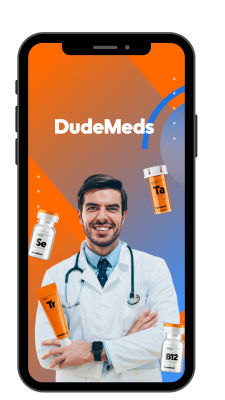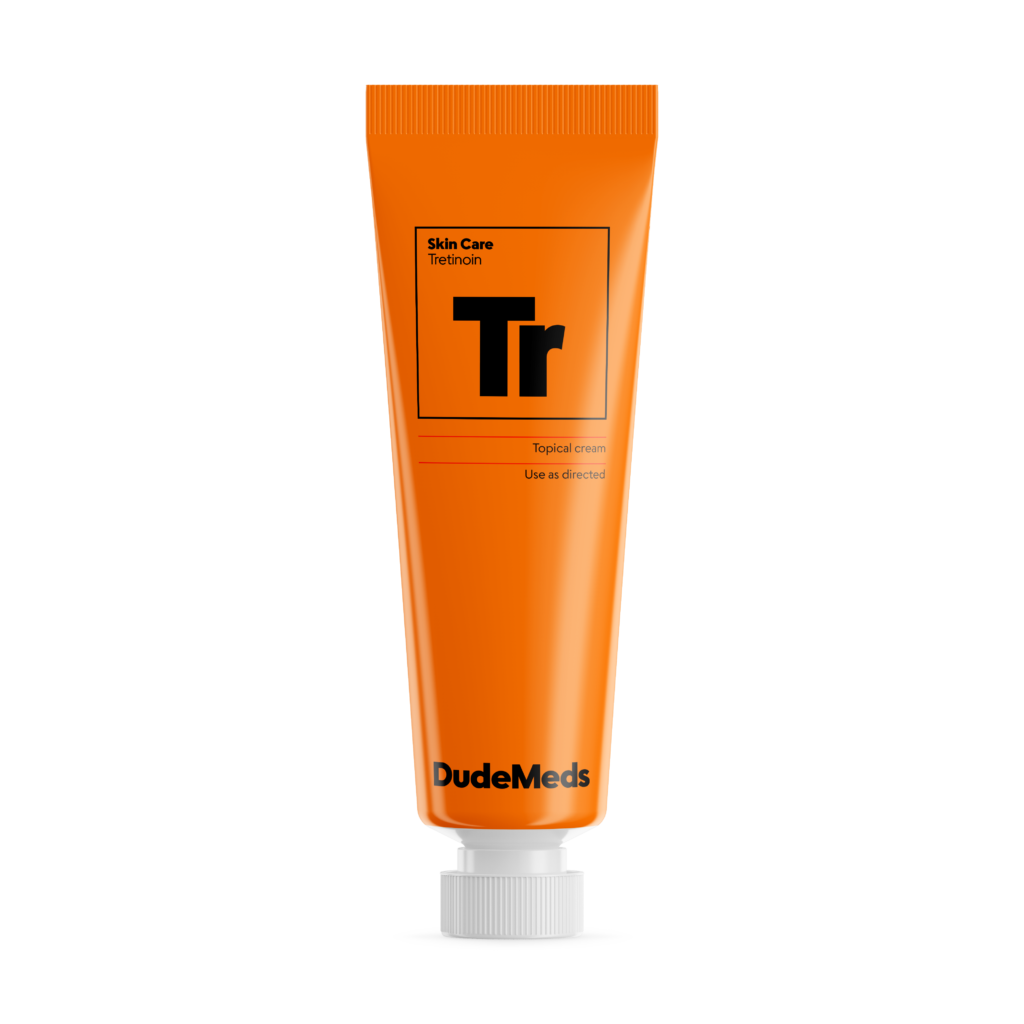
SKINCARE
Futureproof your face
Take control and get clinically proven medications dermatologists prescribe to treat acne and reduce the appearance of fine wrinkles, dark spots, and rough skin texture. Skincare medications digitally prescribed and shipped free right to your door.
Prices from
$19-28 / month
One in five Americans struggle with acne, making it the most common skin condition in the US
There are only about 8,000 certified dermatologists in the US, leading to limited access for many and longer wait times for appointments
What to expect

Begin Your Journey Today

Follow Doctors Application Direction

Begin Seeing Clear Skin
Learn more
The prescription process
- Start with our DudeMeds free digital doctors visit, and answer a few basic questions. If our healthcare providers approve, you will be sent prescription skin care medication directly to your door.
- Depending on your needs, we’ll send you a refill of your skin care medication without the need to redo all the questions and most States there is never a need to see a doctor in person.
- Your DudeMeds provider will review the administration and application process.
- We also provide free direct communication with your prescribing healthcare provider for as long as your treatment plan is active to get the most out of your skin care treatment.

Tretinoin: facts you need to know
Tretinoin is a medication that works by binding to specific receptors in skin cells called retinoic acid receptors (RARs). This triggers a process of gene expression that leads to increased cellular differentiation and renewal, unclogging pores, reducing inflammation, and improving the texture and appearance of the skin. It also reduces sebum production by decreasing sebaceous gland activity, preventing acne formation. Tretinoin stimulates collagen production, increasing skin thickness, and reducing the appearance of fine lines and wrinkles. It is a versatile medication that can improve the health and appearance of the skin in several ways. However, it may cause some initial irritation, dryness, and flaking of the skin, and should be used as directed by a healthcare provider.
Tretinoin is generally safe for daily use, but it should be used as directed by a healthcare provider. The frequency and amount of tretinoin application may depend on the individual’s skin type and the severity of their condition. Initially, tretinoin may cause some skin irritation, dryness, and flaking, but this usually improves as the skin adjusts to the medication. It is important to avoid excessive sun exposure and to use sunscreen while using tretinoin, as it can increase skin sensitivity to sunlight. It is also important to avoid using other skin care products that may be irritating or drying while using tretinoin. Overall, tretinoin is a safe and effective medication for improving the health and appearance of the skin when used as directed.
There are some over-the-counter (OTC) options that may be effective for treating mild to moderate acne and improving the overall appearance of the skin, but they may not be as effective as prescription-strength tretinoin. Some OTC options include:
Retinol: A weaker form of vitamin A that is available in many skincare products. Retinol works similarly to tretinoin but may be less irritating.
Salicylic acid: A beta-hydroxy acid that exfoliates the skin and helps to unclog pores.
Benzoyl peroxide: An antibacterial agent that helps to kill the bacteria that cause acne.
Alpha-hydroxy acids (AHAs): A group of acids that exfoliate the skin and improve the overall texture and appearance of the skin.
While these OTC options may be helpful for some people, it is important to note that they may not be as effective as prescription-strength tretinoin for more severe or stubborn skin conditions. It is always a good idea to consult with a healthcare provider or dermatologist to determine the best treatment options for your specific skin concerns.
Yes, tretinoin can have some side effects, particularly when first starting treatment. The most common side effects include skin dryness, redness, and peeling. Some people may also experience itching, stinging, burning, or mild swelling of the skin. These side effects are usually mild and improve as the skin adjusts to the medication.
In some cases, tretinoin may cause more severe side effects, such as severe skin irritation, blistering, or crusting. If these occur, it is important to stop using the medication and consult a healthcare provider.
Tretinoin can also increase the skin’s sensitivity to sunlight, so it is important to use sunscreen and avoid excessive sun exposure while using this medication.
Some people may experience an initial worsening of their acne or skin condition when first starting tretinoin. This is usually a temporary effect and should improve within a few weeks.
The speed at which tretinoin shows results can vary depending on the individual and the specific skin condition being treated. In general, it can take several weeks to several months of regular use before significant improvement is seen.
For acne, it may take up to 12 weeks of consistent use to see noticeable improvement, with some people seeing results as early as 6-8 weeks. Tretinoin may cause some initial worsening of acne before improvement is seen, so it is important to be patient and continue using the medication as directed.
For anti-aging benefits, such as reducing the appearance of fine lines and wrinkles, it may take several months to see noticeable improvement. Tretinoin stimulates collagen production and increases skin thickness over time, so the full effects may not be seen for several months to a year.
It is important to use tretinoin as directed by a healthcare provider and to be patient when waiting for results. Regular use is key to seeing the full benefits of this medication.
Yes, there are some drugs that may interact with tretinoin. It is important to inform your healthcare provider of all medications you are taking before starting tretinoin to avoid any potential interactions.
The following drugs may interact with tretinoin:
Other topical acne medications: Using other topical acne medications at the same time as tretinoin may increase skin irritation and dryness.
Topical or oral corticosteroids: Using corticosteroids at the same time as tretinoin may increase skin irritation and dryness.
Photosensitizing drugs: Tretinoin may increase the skin’s sensitivity to sunlight, and using other photosensitizing drugs at the same time may increase the risk of sunburn and other skin reactions.
Vitamin A supplements: Taking high doses of vitamin A supplements while using tretinoin may increase the risk of vitamin A toxicity.
Retinoids: Using other retinoid medications at the same time as tretinoin may increase the risk of skin irritation and other side effects.
It is important to follow the guidance of your DudeMeds provider when using tretinoin and to inform them of all medications you are taking.
Semaglutide is administered once a week via subcutaneous injection, typically in the abdomen, thigh, or upper arm. The exact dosing schedule and injection site may vary depending on individual factors such as the dose prescribed, the severity of diabetes or obesity being treated, and the patient’s preference. It is important to follow the dosing instructions provided by your healthcare provider and to use semaglutide exactly as prescribed. Semaglutide is available as a pre-filled pen or as a single-dose vial, and your healthcare provider can show you how to administer the medication safely and effectively at home.
Tretinoin is generally considered safe for long-term use when used as directed by a healthcare provider. As a topical medication, it is less likely to cause systemic side effects with long-term use. However, long-term use of tretinoin can increase the risk of skin irritation, dryness, and sensitivity to sunlight. It is important to follow the guidance of a healthcare provider and use tretinoin as directed to minimize the risk of side effects. Tretinoin is primarily used to treat specific skin conditions, such as acne or signs of aging, and is not intended for daily use as a general skincare product. Overuse or use without medical indication may increase the risk of side effects and may not provide additional benefits.







